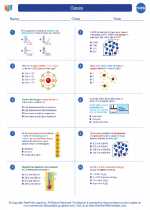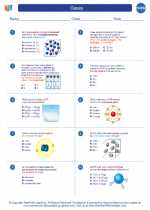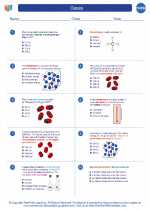Pharmacology
Pharmacology is the branch of medicine and biology concerned with the study of drug action. It involves examining the interactions between chemical substances and living organisms, with a focus on how drugs can be used to diagnose, treat, and prevent disease.
Key Concepts in Pharmacology
- Drug Classification: Drugs can be classified based on their chemical structure, mechanism of action, therapeutic use, and potential for abuse. Understanding these classifications is essential for prescribing and administering medications.
- Pharmacokinetics: This area of study focuses on how drugs are absorbed, distributed, metabolized, and excreted by the body. Factors such as bioavailability, half-life, and drug interactions are important considerations.
- Pharmacodynamics: This field deals with the effects of drugs on the body and the mechanisms of drug action at the molecular, cellular, and systemic levels.
- Drug Metabolism and Elimination: Understanding how drugs are metabolized in the body, particularly in the liver, and how they are eliminated through the kidneys or other routes is crucial for determining dosing regimens and potential drug interactions.
- Therapeutic Drug Monitoring: Some drugs require monitoring of blood levels to ensure therapeutic efficacy while minimizing toxic effects. Therapeutic drug monitoring involves measuring drug concentrations in the blood and adjusting dosages accordingly.
- Adverse Drug Reactions: Pharmacology also encompasses the study of adverse drug reactions, including allergic reactions, side effects, and toxicities. Identifying and managing these reactions is integral to patient safety.
Study Tips for Pharmacology
Here are some tips to help you excel in your pharmacology studies:
- Understand Drug Classifications: Focus on learning the different drug classes, their mechanisms of action, and therapeutic uses. Create charts or flashcards to aid in memorization.
- Master Pharmacokinetics and Pharmacodynamics: Pay close attention to the absorption, distribution, metabolism, and elimination of drugs, as well as their effects on the body. Practice solving problems related to drug dosing and kinetics.
- Stay Updated on New Drugs: Keep abreast of new drug approvals, indications, and safety warnings. Understanding the latest developments in pharmacology is important for clinical practice.
- Utilize Resources: Take advantage of textbooks, online resources, and educational videos to reinforce your understanding of pharmacological concepts. Participate in study groups or discussions with peers to gain different perspectives.
- Practice Critical Thinking: Develop your critical thinking skills by analyzing case studies and clinical scenarios. Consider the potential drug interactions, adverse effects, and individual patient factors that may influence drug therapy.
- Seek Clinical Exposure: If possible, gain practical experience in a clinical setting to observe the application of pharmacological principles in patient care. This can provide valuable context for your studies.
Conclusion
Pharmacology is a complex and multifaceted discipline that plays a crucial role in modern healthcare. By mastering the fundamental principles of pharmacology and applying them to clinical scenarios, you can become proficient in the safe and effective use of medications to improve patient outcomes.
.◂Chemistry Worksheets and Study Guides High School. Gases
The resources above cover the following skills:
Physical Science
Energy - A. Energy is involved in all physical and chemical processes. It is conserved, and can be transformed from one form to another and into work. At the atomic and nuclear levels energy is not continuous but exists in discrete amounts. Energy and mass are related through Einstein's equation E=mc 2 . B. The properties of atomic nuclei are responsible for energy-related phenomena such as radioactivity, fission and fusion. C. Changes in entropy and energy that accompany chemical reactions influence reaction paths. Chemical reactions result in the release or absorption of energy. D. The theory of electromagnetism explains that electricity and magnetism are closely related. Electric charges are the source of electric fields. Moving charges generate magnetic fields. E. Waves are the propagation of a disturbance. They transport energy and momentum but do not transport matter.
Relate temperature to the average molecular kinetic energy.



